Spoilers for Sherlock series 4 episode 1: ‘The Six Thatchers’ below.
A year to the day since the last episode of Sherlock aired and we’re glued to the television for what has become one of the most heavily anticipated crime dramas on the box. What a way to kick off 2017.
Even before the credits roll there’s the small issue of having to tie-up previous loose ends involving Sherlock having shot Magnussen in ‘His Last Vow’. A top-secret briefing ensures Sherlock will not be blamed for the death and reminds us the threat of Moriarty still hangs over him. He may think Moriarty is dead but he’s suspicious of what he’s capable of – a posthumous revenge game perhaps?
“I always know when the game is on. You know why? Because I love it.” Sherlock’s back and it’s game on.
An eerie fable threads through the episode, telling the tale of a merchant who can’t outrun death. The first part of this story, told by voiceover, hints at what is to come, as in true Sherlock form we’re drip-fed pieces of the puzzle to slowly fit together.
It’s not long before a heavily pregnant Mary goes into labour and a baby girl is born. Who wouldn’t choose Sherlock as a godparent? And suddenly the awkward sleuth has more than just himself and his cases to care about.
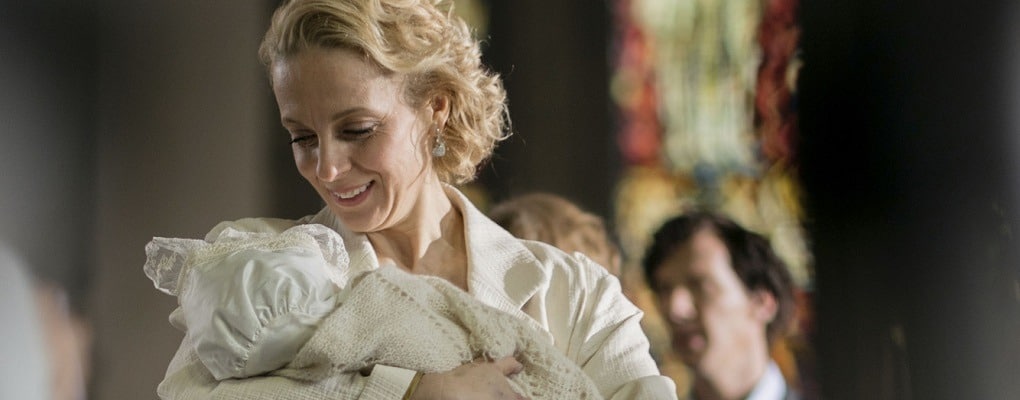
This is a different side to Sherlock. He is protective of the baby, Rosamund Mary, and of the Watson family unit. Cumberbatch cleverly balances this more emotional side to his performance – he’s still the same high-functioning sociopath but there’s more heart to him this series.
When Lestrade turns up at 221B to enlist Sherlock’s help with a tricky case we’re back in familiar Sherlock territory. Nothing’s too tricky for Sherlock as he solves the case almost immediately, but in the process becomes fixated with a smashed statue of Margaret Thatcher.
It turns out Sherlock is on to something, as always, when a second Thatcher is smashed at a different property. Then a third. All Sherlock can assume is it must be to do with Moriarty. He’s ready for him.
The brilliance of Sherlock as a drama is that it always feels like we’re watching a game as well. Sometimes it’s a wild goose chase, often it’s cat and mouse, but always the theatre of Cumberbatch’s performance supported loyally by the rest of the cast makes it a fun and entertaining watch, whatever the twists and turns.
And twists and turns there were. Sherlock lies in wait for the next Margaret Thatcher statue to be stolen and an epic fight ensues. There are struggles, punches, a fall into a swimming pool where the fight continues with plenty of slow-motion face-plunging-into-water moments. Even fight scenes are given the full drama they deserve.

The Thatcher statue is smashed to reveal a USB stick marked with the letters A. G. R. A. Of course we don’t know what it means. Neither does Sherlock. But we know we’re going to enjoy finding out.
A flashback confirms Mary is embroiled and is coupled with a threat to her life. Mary is a dead woman walking and the Thatcher thief is the man who’s planning on killing her. Not if Sherlock has anything to do with it.
Suddenly we’re in Georgia, with the action moving as fast as Sherlock’s mind. It’s six years previous and a code word command leads to the failure of a rescue attempt by four super spies in the British Embassy. One of those spies is Mary, with Amanda Abbington making a convincing kick-ass special agent alongside AJ, the thief now wanting her dead because she betrayed him. But was it really her?
This mystery turns out to be the real thrust of the episode, which seemed to take its time getting to the point. But once it does the stakes are high with Mary on the run, Sherlock hot on her heels and John left holding the baby, slightly redundant at points.
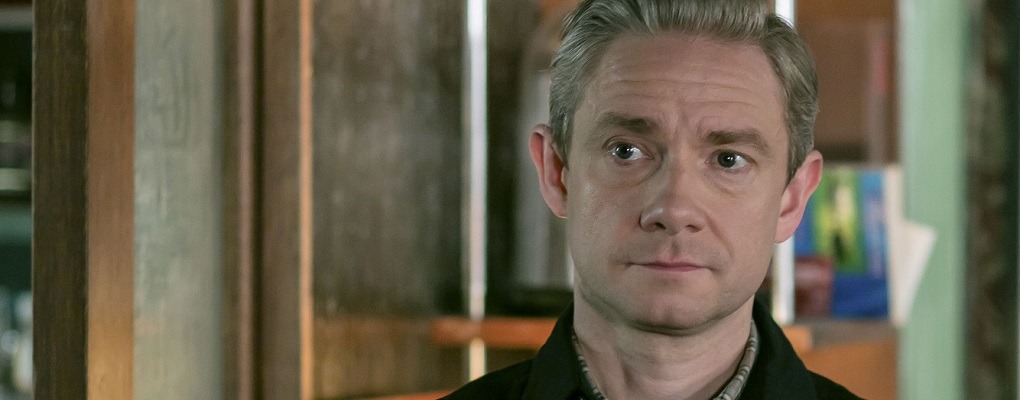
The star of the episode is Amanda Abbington, and rightly so, as the drama trawls through the secrets and lies of her past life making her the woman she is now.
The story climaxes in the shadows of the London aquarium, as Sherlock solves the mystery of who really betrayed AJ and Mary repays his loyalty with the ultimate sacrifice.
In Arthur Conan Doyle’s source books John Watson is said to be bereaved. So perhaps the conclusion of the episode was a predictable inevitability? Even so, it was a surprising twist that will have seen Sherlock fans screaming at the television, as Abbington delivered a tender and emotional final speech to a teary Watson.
The end of the episode sees Sherlock and Watson broken, but Sherlock with a new case that may be the hardest of his career. He needs to save John Watson. But can he do it?
Roll on next week to find out…
Did you tune in for Sherlock series 4 episode 1? Let us know your thoughts in the comments below!
Join the discussion
Please note: Moderation is enabled and may delay your comment being posted. There is no need to resubmit your comment. By posting a comment you are agreeing to the website Terms of Use.
Spoilers for Sherlock series 4 episode 2: ‘The Lying Detective’ below. Still catching up? Read Isla’s review of episode 1 here.
After a week that saw Sherlock co-creator and Mycroft actor Mark Gatiss respond to ‘Sherlock is Bond’ criticism with a hilarious poem, we’re back tuned to the box for Sunday night appointment-to-view television, the second episode of the new Sherlock, cryptically titled ‘The Lying Detective’.
Who can forget the shock of Mary’s death in episode 1, leaving Sherlock and Watson polarized in grief and guilt. Then there’s the mysterious ‘Miss Me?’ DVD, left by Mary with a request for Sherlock to save Watson. But will he? It’s edge of the sofa stuff as we find out…
The next instalment opens with Watson in counselling, having not spoken to Sherlock in weeks. Unlike Mary, with the return of the brilliant Amanda Abbington, who appears by his side as a vision from beyond the grave.
Suddenly there’s a screech and a crash as an Aston Martin narrowly misses the house. A flash of dark hair. Could it be Sherlock?
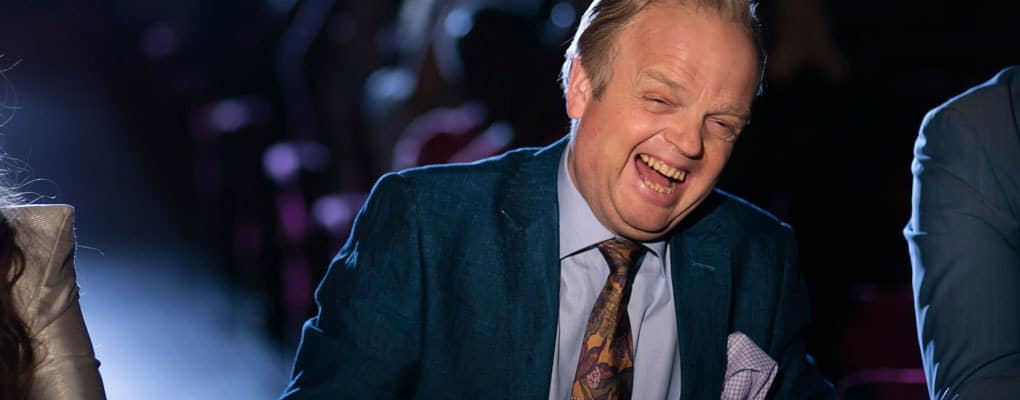
Written by co-creator Steven Moffat, the second episode has an enormous amount to deal with but quickly introduces us to the baddie of the episode – Culverton Smith – played spectacularly by Toby Jones. Jones pulls out all the stops with his Culverton portrayal of a yellow-teethed, sleazy, entrepreneur/ philanthropist. Jones revels in the evil from the off.
Speaking to a group of invited guests in a glossy, high-rise office Culverton confesses he has a problem he needs to share. His daughter, Faith, is part of the group, and he drugs her to make her forget his compulsive confession. He needs to kill someone. But who?
It’s Faith that presents Sherlock with the crime to solve, with a note she wrote about her father’s confession, missing only one detail – his victim’s name. Sherlock is skitzy, Cumerbatch’s performance in over-drive, as the needle on the coffee table and the stubble on his chin make it exceedingly obvious he’s back on the drugs. This isn’t good for anyone.
Inspired by Faith’s case, Sherlock leaves the flat for the first time in weeks to walk the streets. His mental and physical vulnerability make his fast-paced visions difficult to catch or make sense of. But it’s all part of the plan.
Three weeks later and we pick up with Watson and the Aston Martin to discover that it’s Mrs. Hudson, the wonderful Una Stubbs, who appears from behind the wheel. It’s good to see the series still retains its sense of humour. With a drugged Sherlock in mania, convinced that Culverton is the most dangerous, undetected serial killer the world has ever seen, Mrs. Hudson calls on Watson to help.
The episode presents us with the mystery versus our two dysfunctional heroes neatly and sets all three on a fast-paced collision course. It’s expert storytelling at its very best.
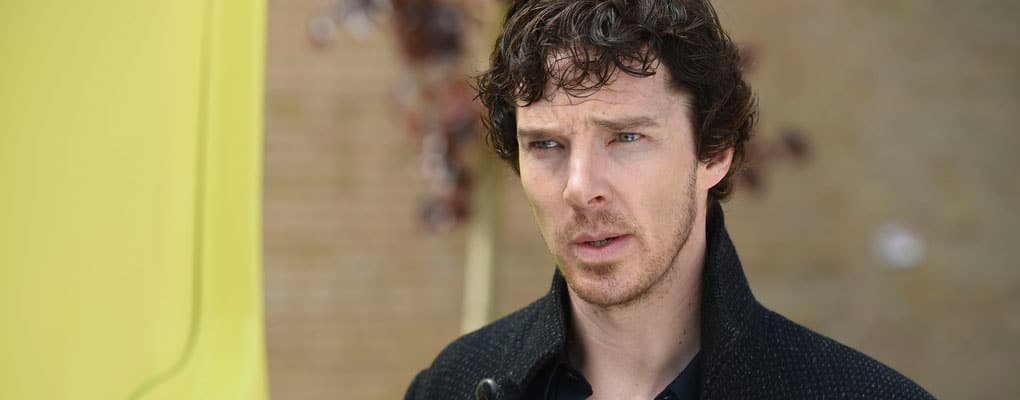
Lured to the hospital where Culverton does much of his charity work, Sherlock believes he can outwit the slippery philanthropist but Culverton appears a match to Sherlock’s gameplay. There are twists, turns and shocks fitting of any Sherlock episode, aptly demonstrating Moffat and Gatiss’ nightmarish imaginations. A Sherlock roller-coaster that you need to keep your wits about you to keep up.
Culverton’s elongated creepy laugh underpins the realization that Sherlock is losing the game, as Sherlock lashes out at the one thing he doesn’t understand and lands himself in trouble once again. This time Watson’s really had enough.
With Sherlock and Watson split once more, Mary’s back with Watson gently encouraging him to do some of his own detective work. It doesn’t take long for Watson to find out something about Sherlock from Mycroft that no one knew. But how does it all piece together?
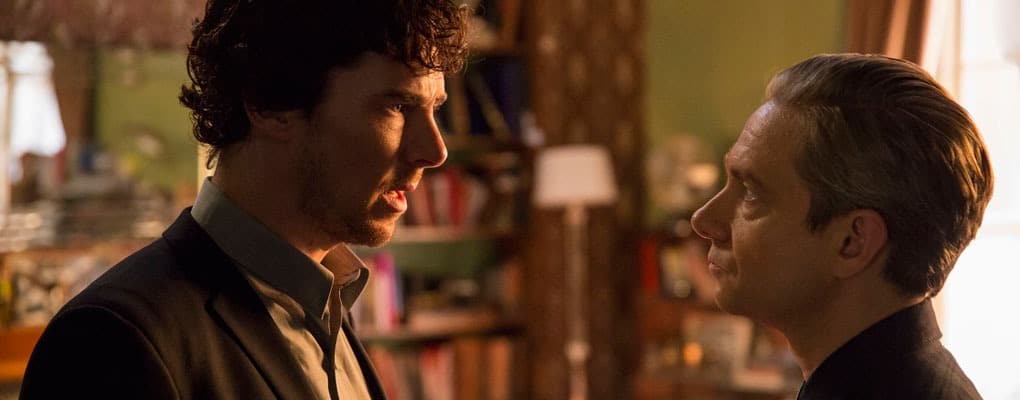
Mary’s ‘Miss Me’ DVD is discovered and as John watches the puzzle starts to make sense. But with a weak Sherlock in hospital openly inviting Culverton to fulfil his evil potential, is it too late for Watson? The performances by Cumberbatch, Jones and Watson are exceptional, as the unthinkable comes incredibly close to happening and Mary’s dying wish comes true.
This is a dark and emotionally difficult episode, which is poignantly concluded with the pair – Sherlock and Watson – back in 221B on what turns out to be Sherlock’s birthday. A delicate heart-to-heart brings the men emotionally closer than they’ve been for some time, exposing the fragility of them both.
Back where it began, with Watson in counselling, the episode takes a final dramatic twist that leaves Sherlock fans with another fantastic cliffhanger to mull over in the week ahead. Watson’s counsellor removes her disguise to reveal her real identity, as a shot is fired at Watson.
Suddenly a week seems a long time when you need to know what happens next…
Did you tune in for Sherlock series 4 episode 2? Let us know your thoughts in the comments below!
Join the discussion
Please note: Moderation is enabled and may delay your comment being posted. There is no need to resubmit your comment. By posting a comment you are agreeing to the website Terms of Use.
Spoilers for Sherlock series 4 episode 3: ‘The Final Problem’ below. Still catching up? Read Isla’s review of episode 2 here.
Episode 2 left us with a double cliff-hanger. First there was the discovery of Eurus, Sherlock’s evil genius sister. What is she capable of? Then there was the bullet fired in the direction of Watson. Will he survive? The expectations are high for the series finale, but can it deliver?
The Sherlock team never fail to delight and pre-credits on this final episode they deliver a shock to be proud of. A terrified young girl on a plane of sleeping people who won’t wake up answers a ringing telephone. A tuneful voice on the other end greets her and Jim Moriarty welcomes us to the final problem. Despite his apparent death, Moriarty’s never been far from Sherlock’s mind, so perhaps it’s no surprise that we’re introduced to the mystery of the episode by his old nemesis. We know immediately Moriarty will bring fireworks fitting of a finale and can’t wait to watch him do his worst.
An odd sequence in Mycroft’s house with a creepy clown reunites Sherlock, Watson and Mycroft over the problem of Eurus. Looks like Watson survived that bullet – actually a tranquilliser dart – after all. These tangential sequences are great in setting the scene for an episode that keeps an audience guessing about what’s really going on until the very end.
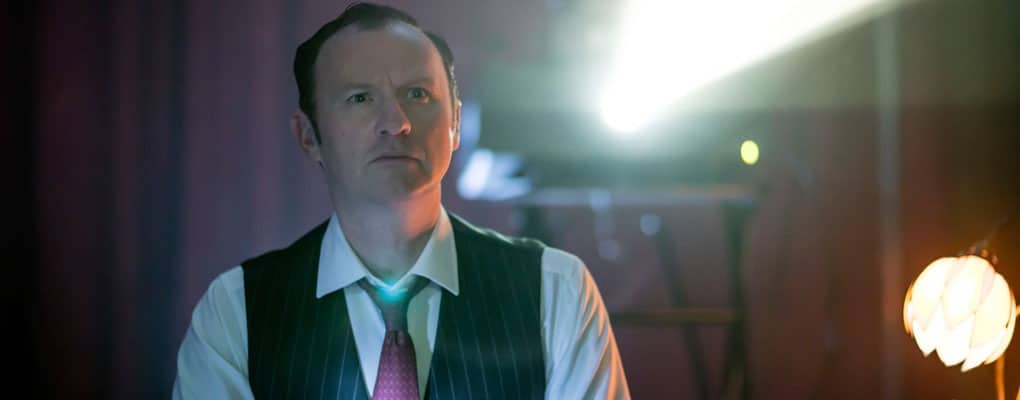
Back in 221B we’re delivered a reasonable amount of exposition, as Mycroft explains what happened to Eurus. Flashbacks of a young Sherlock, Mycroft and Eurus provide a new perspective on the trio as children, including an exceptionally well-cast Sherlock as a young boy, who could easily pass for a young Cumberbatch. As we discover why Eurus was taken away from the family home, a grenade is flown into 221B, with Sherlock and Watson escaping in slow-motion in a James Bond style explosion sequence. The episode is certainly firing on all cylinders.
The majority of the rest of the action takes place on the island Eurus has been held on, in a (not so) secure hospital facility. Eurus, played fantastically by Sian Brookes, cuts an eerie figure in the facility. The control in her performance is to be commended, as she convincingly portrays a woman on the edge, capable of anything.
But what of Moriarty? His return in person to the series is probably one of the best moments of the episode, emerging from a helicopter in dark glasses with a spring in his step to the tune of Queen’s ‘I Want To Break Free’. Though it’s only another flashback, it’s great when a baddie puts a smile on your face.
When Sherlock comes face to face with Eurus the pieces of the plot start to connect, as Eurus challenges Sherlock to a game. Sherlock, Watson and Mycroft must work together through various challenges to save the pre-credits little girl and the plane. Or so we think.
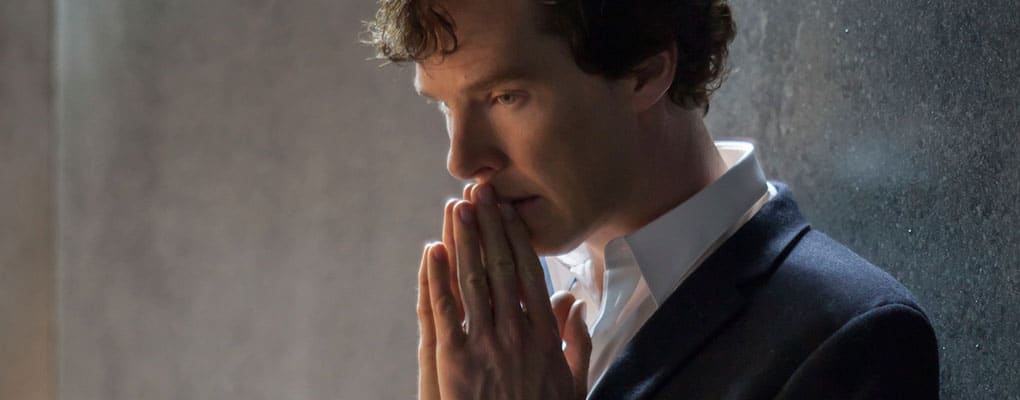
At its heart this is a personal story for Sherlock with just the key players involved. It’s a much slower paced episode, especially compared to the rest of the series – but this is welcomed as it allows Eurus to really get inside the head of Sherlock and we see a more focused, humane performance from Cumberbatch. With life and death on the line the stakes are high. There’s plenty of jeopardy and unpredictable moments, particularly when Sherlock turns a gun on himself. Co-written by both Sherlock creators Steven Moffat and Mark Gatiss, it feels like the episode was written as a response to what would Sherlock’s worst nightmare be? And up against a darker, seemingly immoral version of himself, this is a game that even Sherlock can’t predict.
Eurus’ game ends in the house they grew up in, as if the siblings have come full circle. Sherlock is at her mercy as Watson’s life is in danger once again but with so many threads to tie together it doesn’t feel like we experience the full impact of this or any of the others.
One emotionally poignant moment that does really work is when Sherlock reaches out to Eurus, brother to sister. It’s loving and heartfelt, with a real connection between Cumberbatch and Brookes. But before we know it the mystery is solved, the action is wrapped up and we’re left slightly deflated.
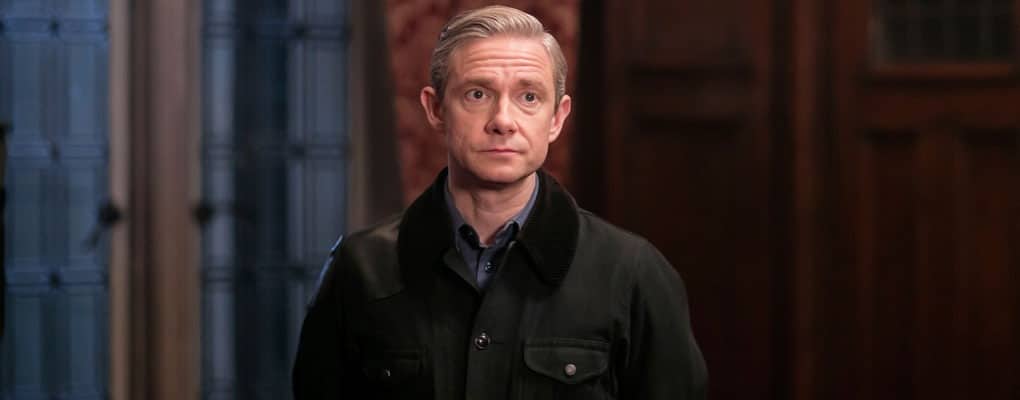
It’s left to Molly to lift our spirits, with the arrival of another DVD entitled ‘Miss You’, which gives Mary the opportunity to neatly sum up the Sherlock and Watson partnership and us to see a montage of their crime-busting friendship. It’s a somewhat sentimental ending – but love or hate the final episode, Sherlock should be celebrated as an ambitious, genre-defining phenomenon. And with rumours that this may be the last we see from the deer-stalker hat wearing super sleuth, is the game really finally over?
Arthur Conan Doyle published the short story ‘The Final Problem’ in 1883, with the intention to kill off his much-loved character Sherlock Holmes. Pressure from fans eventually persuaded Conan Doyle to revive his most famous detective and the adventures of Sherlock Holmes were far from over.
Perhaps Moffat and Gatiss are destined for the same path as Conon Doyle? Albeit without the killing-off trick, as they’ve pulled that one before. Whatever happens with the future of Sherlock we can be safe in the knowledge that if Sherlock can come back from the dead, Watson survives despite constantly finding himself in danger and Moriarty can return to revenge from beyond the grave, in the world of Sherlock anything can happen. We just might have to wait for it.
Did you tune in for Sherlock series 4 episode 3? Let us know your thoughts in the comments below!
2 Comments
Join the discussion
Please note: Moderation is enabled and may delay your comment being posted. There is no need to resubmit your comment. By posting a comment you are agreeing to the website Terms of Use.
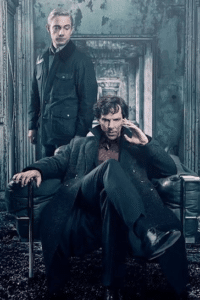



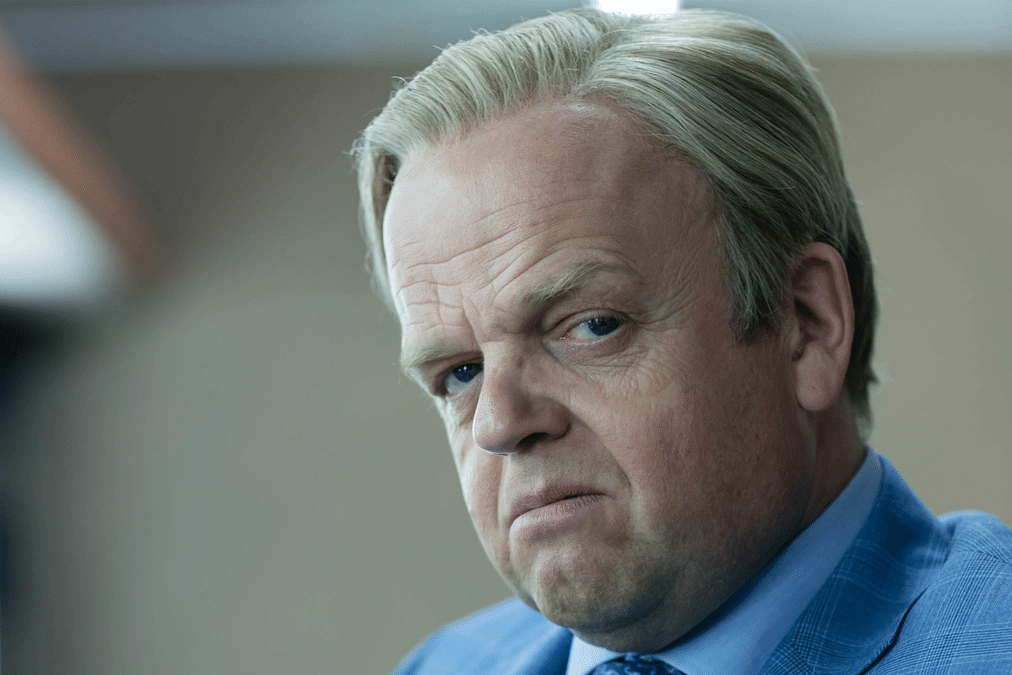
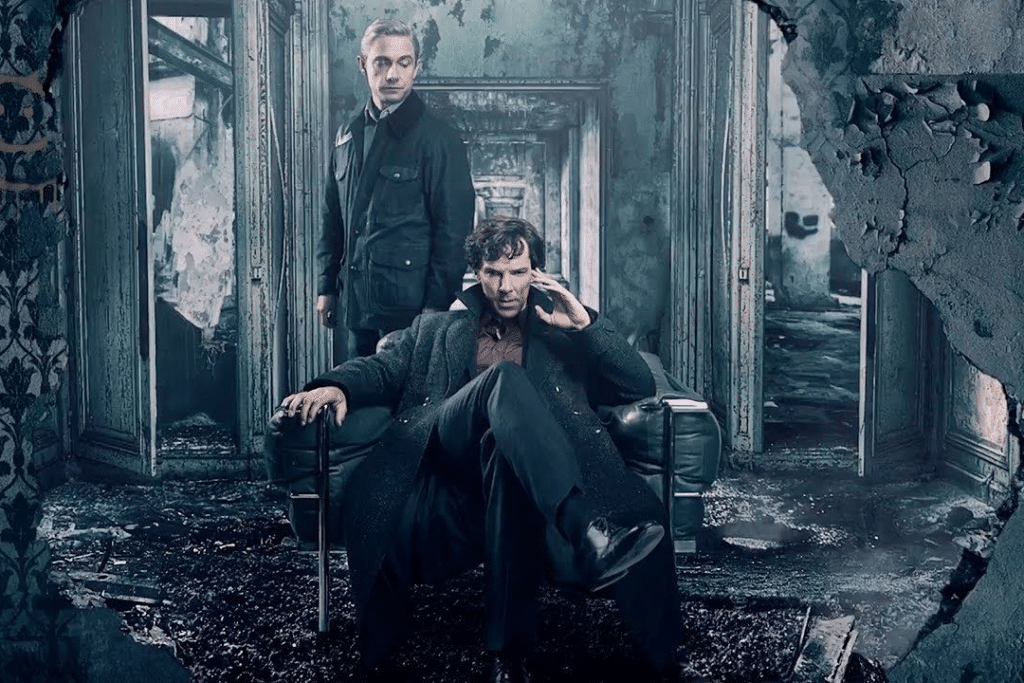
I loved it from start to finish. There were a few really key moments for me, with the main one being Mrs Holmes comment to Sherlock, “You always were the grown-up?” It completely rewrites everything we’ve known and assumed about Sherlock and that he’s believed about himself.
He rewrote his history to cope with a childhood trauma and in facing that trauma is somewhat freed from its influence.
I work as a psychotherapist and often see this dynamic played out with my clients.
Like many others I hope if there are any future episodes they return to their old sleuthing ways with less James Bond style action. I believe their characters will be richer for the journey they have been on though.
That’s just about the first rational review I’ve read. Well done.